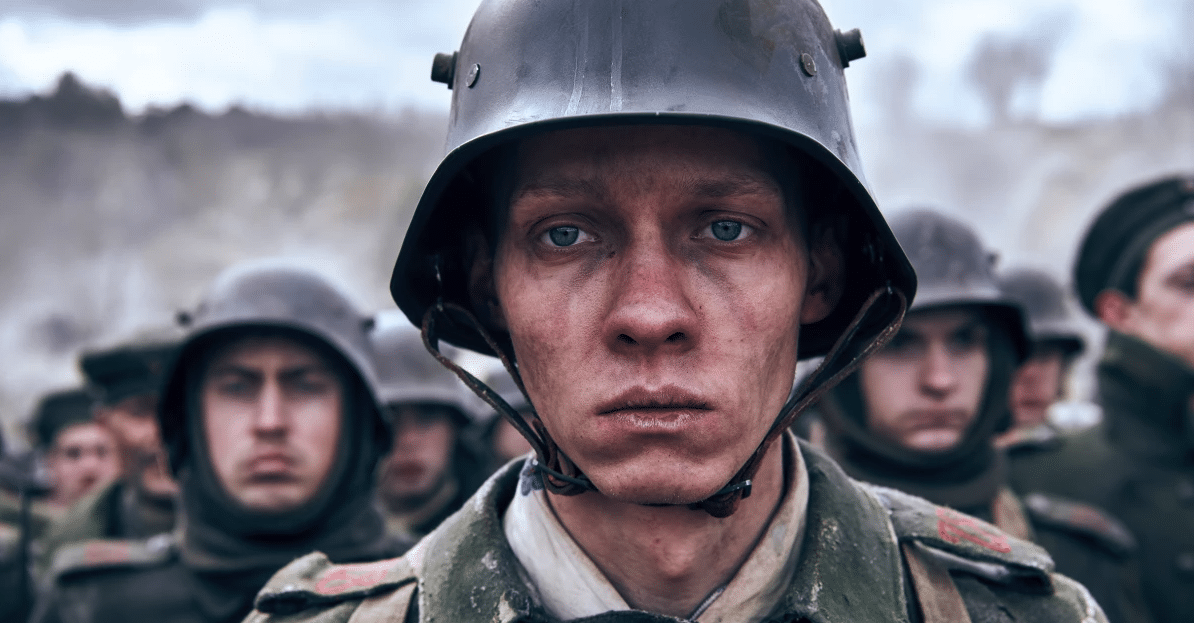Even those of us born long after World War One know the guns (well, most of them) fell silent on the eleventh hour on the eleventh day of the eleventh month, which is to say: at 11am on 11 November 1918, paving the way for negotiations that would culminate in the Treaty of Versailles being signed on 28 June 1919.
That 11am armistice is still marked annually with a minute’s silence in Commonwealth countries on Remembrance Day, its focus widened to all those who have died or suffered in all wars and armed conflicts.
As with many people’s feelings about the day itself, films about WWI often try to strike a balance between celebrating the genuine heroism, sacrifice and acts of humanity shown by those directly involved in conflict and the conviction (or simple observation) that wars necessitate an almost incomprehensible waste of life. The following five films, I think, get that balance right, or at least try to.
All Quiet on The Western Front (2022) – Netflix
I’ve never read the 1929 novel by Erich Maria Remarque, a German veteran of WWI, but the fact it was banned by Hitler’s Nazi regime as ‘an affront to German Pride’ speaks volumes. Nor have I seen the epic – and highly lauded – 1930 film version, so I went into this new adaptation, currently showing on Netflix, knowing only that it was about the Great War. As per the Netflix synopsis:
When 17-year-old Paul joins the Western Front in World War I, his initial excitement is soon shattered by the grim reality of life in the trenches.
Unsurprisingly, the emphasis is very much on that grimness. We watch teenagers with guns standing knee-deep in water in freezing cold trenches as creeping artillery barrages rain down on them; we see them sticking their heads up only to be shot at, and clambering out of the trenches at their superiors’ command only to run exhaustedly into enemy fire.
Directed by Edward Berger and starring Felix Kammerer, Albrecht Schuch and Aaron Hilmer, this 2022 film version is dubbed into English rather than having subtitles, which feels a bit weird, really, but it doesn’t take away from the masterful sound design elsewhere in the film and the overbearing sense – lest we forget – that there’s no glory whatsoever in people slaughtering each other.
And, without giving spoilers, the ending will give you a whole new frame of reference when you stop for a minute’s silence this Remembrance Day.
1917 (2019) – Prime Video
Filmed to give the impression of being one continuous shot, Sam Mendes’ 2019 film adds a sense of ‘real time’ jeopardy to the horrors (and occasional quiet moments) of WWI. The story was supposedly inspired by accounts Mendes heard from his grandfather, who served in that war (like the film’s protagonists) as a ‘runner’.
As per the IMDB synopsis:
April 6th, 1917. As an infantry battalion assembles to wage war deep in enemy territory, two soldiers are assigned to race against time and deliver a message that will stop 1,600 men from walking straight into a deadly ambush.
We follow Blake (Dean Charles Chapman) and Schofield (George McKay) as they try to complete their mission, the already vertiginous stakes raised higher by the knowledge Blake’s brother is among the 1,600 soldiers at risk of imminent ambush. Confusion, claustrophobia and carnage abound as it becomes clear – if it wasn’t already – that war is a hideous and brutalising game of chance.
War Horse (2011) – Prime Video
Rather than drop us straight into the gut-wrenching heat of battle as he did in Saving Private Ryan (1998), this 2011 film by Steven Spielberg slowly builds the central relationship between Albert (Jeremy Irvine) and his beloved horse, Joey, on an idyllic-looking farm in the British countryside that seems about as far from the horrors of the front line as possible. Of course, we know from the outset – even if Albert doesn’t – that the world’s about to change.
When it does, in 1914, Albert’s father sells Joey to the British cavalry to help in the war effort.
Bereft, and too young to enlist and find his horse, Albert has to sit the war out until 1918, when he’s old enough to become a soldier, at which point he’s shipped to the Second Battle of the Somme, not knowing as yet that his beloved colt is now in the hands of the Germans.
If you haven’t seen it, you might be thinking: ‘What? So, this guy goes looking for his horse in the middle of a conflict that killed and maimed millions of people, and we’re supposed to feel moved by that?’
If you have seen it, you’re probably tearing up already.
They Shall Not Grow Old (2018) – Apple TV
This 2018 documentary by Peter Jackson is the very definition of bringing the past to life, even as it highlights a conflict that brought death and destruction beyond anyone’s worst nightmares.
Created with footage from WWI (most of it previously unseen) and featuring audio of Imperial War Museum interviews with British servicemen, the colourisation, sound design, production techniques and voice actor work amounts to a masterpiece of restoration. The effect: black-and-white people from a silent past can be seen for what they were: real people, in full colour, in the midst of a noisy living hell.
As one of the interviewees says, much of the ‘war effort’ was about working with ‘frightened children who had to be made into soldiers’.
Gallipoli (1981) – Binge
Peter Weir’s 1981 film still stands as one of the best evocations of a war that produced genuine heroism alongside the very worst of human nature. Starring Mel Gibson and Mark Lee as young soldiers from Western Australia, its portrayal of the doomed 1915 Gallipoli campaign sets the beauty of ‘mateship’ and youthful optimism against the incompetence (and resulting tragedy) of those giving the orders.
The final scene, in which Frank (Gibson) races up a hillside trying to avert a doomed charge from the trenches while Mark (Lee) recites motivational phrases from his track running days before being sent over the top encapsulates the tension and desperation at the heart of the film.
As Daniel Raynaud wrote for ScreenHub earlier this year, this was a film that:
presented an updated version of Anzac mythology, heroicising the simple Australians from the bush while excoriating the British for incompetent and callous leadership. As a seminal film in Australia’s cinematic history, Gallipoli is perhaps the single most influential text on Anzac, and its indelible portrayal of the tragic death of its lead character at the hands of a pompous British high command still resonates with a public that frequently blames the British for the tragedies of the war.
ScreenHub: How Anzac movies fuel the Anzac myth, then and now





